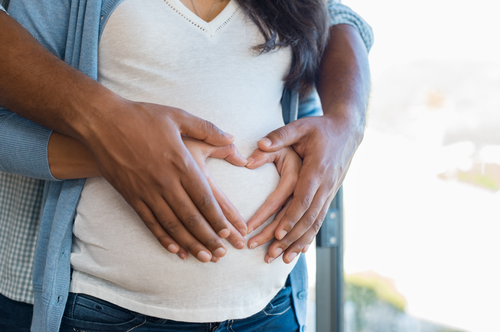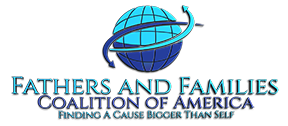Posts
Empowered Fathers, Safer Mothers: Reducing Maternal Mortality Together
Authored by Ashley Torres, Father Involvement Specialist, Camden Healthy Start and Tatiyana Stubbs, Health Educator, Camden Healthy Start, The Cooperative
Fathers play a crucial role in reducing maternal mortality by ensuring timely care, providing emotional support, and assisting during critical periods. This blog highlights the importance of father involvement in maternal health and how empowering fathers can lead to healthier outcomes for mothers and children.

Maternal mortality remains a critical issue globally, but often overlooked in discussions about improving maternal health is the pivotal role fathers can play. Empowering fathers to be actively involved in pregnancy, childbirth, and postnatal care is not only a way to support women emotionally but can also have a profound impact on reducing maternal mortality rates. While maternal health discussions often center around women's roles, the involvement of fathers plays a pivotal role in improving maternal outcomes and significantly reducing the risks of maternal mortality. This blog will explore the connection between empowered fathers and safer mothers and how working together can transform maternal health outcomes.
The Global Maternal Mortality Crisis
Maternal mortality refers to deaths caused by complications from pregnancy or childbirth. While many countries have made strides in lowering these rates, maternal mortality remains alarmingly high in many parts of the world. According to the World Health Organization (WHO), approximately 295,000 women died due to complications related to pregnancy and childbirth in 2017. The vast majority of these deaths are preventable, with timely medical care and the right support systems in place. Reducing maternal mortality requires not only medical intervention but also active, informed involvement from fathers who can play a key role in ensuring maternal health and safety.
Why Father Involvement Matters
Traditionally, pregnancy and childbirth have been viewed as predominantly women’s issues, but fathers have a crucial role to play. Studies have shown that when fathers are engaged in maternal care, it leads to better health outcomes for both the mother and the child. Active involvement means more than just being present; it involves understanding the mother’s physical and emotional needs, advocating for her well-being, and supporting her through medical appointments, labor, and postpartum recovery. In addition to offering emotional support, fathers who are educated about potential complications in pregnancy are better prepared to respond to emergencies that could otherwise be missed.
When fathers are educated about the risks associated with childbirth, they can be vigilant and proactive in ensuring their partners receive necessary care. Fathers who understand pregnancy complications, such as preeclampsia, postpartum hemorrhage, or infections, can act quickly to seek medical assistance, potentially saving the lives of both mother and child.
Breaking Down Barriers: Creating Supportive Communities
One of the major barriers to father involvement is societal and cultural expectations. In some communities, pregnancy and childbirth have traditionally been viewed as exclusively women’s domains, with fathers often relegated to a more passive role. Breaking down these barriers requires a shift in mindset and greater access to resources that educate fathers on how to be actively engaged. Healthcare providers and maternal health programs should focus on including fathers in conversations from the very beginning of pregnancy. Offering father-friendly childbirth classes, providing education on maternal health complications, and encouraging fathers to accompany their partners to prenatal visits can foster a sense of shared responsibility. When fathers feel empowered to support their partners, they become valuable advocates for maternal health.
Programs such as community-based prenatal classes, where fathers are invited to participate in discussions about maternal health and childbirth, are already showing success in breaking these traditional barriers. These initiatives help build a culture where both parents are equally invested in the health of the mother and child.

How Fathers Can Help Reduce Maternal Mortality
- Advocating for Timely Care: Fathers can play a key role in ensuring that mothers receive early and consistent prenatal care, which is essential for identifying and managing risks before they escalate. A father’s awareness of the importance of regular checkups and screenings can make all the difference in early detection.
- Learning the Warning Signs: Fathers should be educated on the warning signs of pregnancy complications. Being aware of symptoms like severe headaches, excessive bleeding, or shortness of breath allows them to take swift action if something goes wrong. Early intervention can be lifesaving for both the mother and the baby.
- Emotional and Physical Support: A father’s involvement in the birthing process can reduce stress and provide emotional security for the mother. Studies show that fathers who provide physical comfort during labor and offer continuous emotional reassurance can help reduce the mother’s stress levels and improve birth outcomes. Stress reduction is known to improve health outcomes, especially during labor and postpartum recovery.
- Postpartum Care: Fathers who take an active role in postnatal care can help monitor the mother’s recovery, assist with newborn care, and provide the emotional and physical support needed during this critical period. Fathers who engage in both physical and emotional support can help ease the mother’s transition into new motherhood, ensuring a healthier recovery for both her and the child.
- Promoting Health Equity: Healthcare access is limited in many underserved communities. Fathers can help bridge this gap by advocating for their families, ensuring they have access to the necessary resources, and supporting maternal health policies that focus on equity. Fathers can also work to break down stigmas around male involvement in maternal health and create a more inclusive, supportive environment for families.
Conclusion: A Shared Responsibility for Life
Empowering fathers to take a more active role in maternal health is not just about emotional support; it’s about saving lives. Reducing maternal mortality requires a collective effort, where fathers are seen as essential partners in the journey of pregnancy, childbirth, and recovery. By fostering a culture of shared responsibility, we can create safer environments for mothers, healthier outcomes for children, and stronger, more connected families.
Now, more than ever, it’s essential that we embrace shared responsibility in maternal health. Let’s empower fathers, support mothers, and work together to ensure that every pregnancy is safe. When fathers are empowered, mothers are safer, and together, we can help ensure that no woman loses her life while giving life.
About the team in Camden
We are excited to introduce three distinguished speakers who will be featured at the 26th International Families and Fathers Conference, Building Bridges:
Ambrial Ugoji, MSW
Assistant Director, Project Director of Camden Healthy Start, The Cooperative
Ambrial Ugoji brings a wealth of experience in maternal and child health, serving as the Assistant Director and Project Director of Camden Healthy Start. With a deep commitment to improving the health outcomes of mothers and children, Ambrial has been instrumental in leading efforts to empower fathers and enhance their involvement in the maternal health process. Her leadership in the Camden Healthy Start initiative has made a significant impact on reducing maternal mortality and promoting healthier families in the community.
Ashley Torres
Father Involvement Specialist, Camden Healthy Start
As a Father Involvement Specialist at Camden Healthy Start, Ashley Torres plays a vital role in engaging fathers and ensuring they are active participants in their families' health and well-being. Ashley's expertise in fostering strong, supportive relationships between fathers and their children, especially during the crucial stages of pregnancy and childbirth, has been integral in creating safer environments for mothers and promoting maternal health.
Tatiyana Stubbs
Health Educator, Camden Healthy Start, The Cooperative
Tatiyana Stubbs, a dedicated Health Educator at Camden Healthy Start, focuses on empowering families with the knowledge and tools they need to thrive. Her work includes providing education on maternal health and the essential role fathers play in reducing maternal mortality. Tatiyana’s contributions are key to building a supportive community where fathers are equipped to support their partners and become active agents of change in the maternal health system.
Together, Ambrial, Ashley, and Tatiyana will lead a powerful workshop titled "Empowered Fathers, Safer Mothers: Reducing Maternal Mortality Together". This session will explore the crucial role of fathers in ensuring safer pregnancies, advocating for timely medical care, and providing emotional and physical support to mothers. Their shared expertise and passion for family health will provide attendees with valuable insights into how empowering fathers can help reduce maternal mortality rates and create healthier outcomes for families.
We look forward to their session at the 26th International Families and Fathers Conference: Building Bridges!

